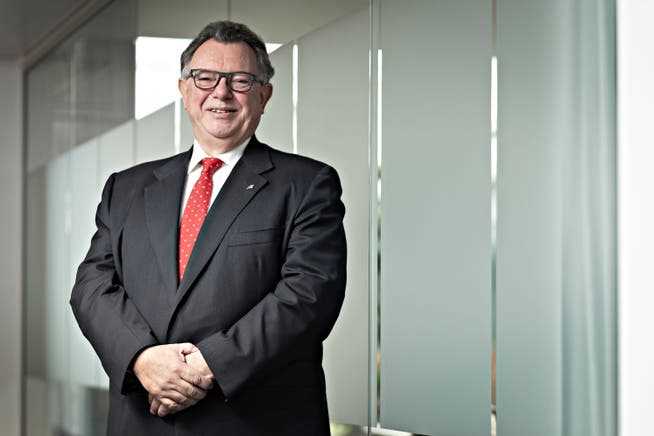As UBS boss, Hamers earns significantly less than his predecessor Ermotti
UBS boss Ralph Hamers earned CHF 11,498,271 last year.
tsf. UBS CEO Ralph Hamers earned a total of CHF 11,498,271 last year, as the big bank announced in its remuneration report on Monday. That is significantly less than the 13,323,244 francs that Hamer’s predecessor, Sergio Ermotti, received in his last year in office. Hamers’ fixed salary was 2,998,271 francs, the variable salary component came to 8,500,000 francs.
The remuneration of the entire Executive Committee in 2021 totaled CHF 107.8 million. The amount fell significantly compared to the previous year (115.9 million Swiss francs). The board of directors earned 12.1 million francs, compared to 11.8 million francs in the previous year.
Uncertainties are increasing: China’s foreign trade is growing more slowly
(dpa) China’s foreign trade lost momentum at the beginning of the year. As the Beijing customs administration announced on Monday, the exports of the second largest economy increased by 16.3 percent in January and February compared to the previous year. In December, export growth was still 20.9 percent.
At 15.5 percent, China’s imports also grew more slowly than in December, when imports increased by 19.5 percent. Foreign trade growth, while slowing, was still slightly above average analyst expectations. Because of the fluctuations caused by the Chinese New Year, which always falls differently in January or February, China combines the data for the two months.
The outlook for the coming months is likely to cloud over, also against the background of the Ukraine war. It is true that neither Russia nor Ukraine alone are decisive for Chinese foreign trade. However, should the situation deteriorate further and the global economy suffer a severe setback, for example due to the rising oil price and other uncertainties, Chinese exporters would also feel the effects.
Thanks to booming orders from all over the world during the corona pandemic, which China was able to bring under control early on with strict measures, Chinese foreign trade grew strongly last year. Factories worked at full speed. But for this year, the government in Beijing is assuming that exports, which make up an important part of Chinese economic growth, will develop significantly less dynamically.
“It is becoming increasingly difficult to maintain steady export growth,” Chinese Premier Li Keqiang warned on Saturday at the start of the Beijing People’s Congress. In his speech, he prepared the nation for an economically difficult year. “The Covid-19 pandemic is still ongoing. The global economic recovery lacks momentum and commodity prices remain high and prone to volatility,” said Li Keqiang, speaking of a “volatile, serious and uncertain” environment. There are “many potential risks” in the economic and financial sector.
Not only global risks, but also domestic problems such as a real estate crisis, over-indebtedness and lack of energy are putting pressure on growth.
UBS board member Reto Francioni will not stand for re-election

Reto Francioni resigns from the UBS Board of Directors.
tsf. There are several changes on the board of directors of the big bank UBS. As is already known, the Chairman of the Board of Directors, Axel Weber, will not stand for re-election at the Annual General Meeting on April 6 due to the term limit. Colm Kelleher is to take his place. As UBS announced on Monday, Board member Reto Francioni is no longer standing for re-election. Francioni, who has been a member of the board of directors since 2013, is to become chairman of the supervisory board of UBS Europe SE.
The unemployment rate in Switzerland falls to 2.5 percent
tsf. The Swiss unemployment rate fell from 2.6 percent to 2.5 percent in February. As the State Secretariat for Economic Affairs (Seco) announced on Monday, unemployment fell by 49,983 people (-29.8 percent) compared to the same month last year.
According to Seco surveys, 117,970 unemployed were registered at the regional employment centers (RAV) at the end of February, which is 4,298 fewer than in the previous month.
Youth unemployment (15 to 24 year olds) fell by 271 people (-2.6 percent) to 10,129. Compared to the same month last year, this corresponds to a decrease of 7,199 people (-41.5 percent).
The number of unemployed aged 50-64 fell by 1,225 people (-3.2 percent) to 36,643. Compared to the same month last year, this corresponds to a decrease of 10,645 people (-22.5 percent).
In December 2021, 42,077 people were affected by short-time work, which is 2,676 fewer (-6.0 percent) than in the previous month. The number of affected companies fell by 1,096 units (-14.8 percent) to 6,288. The lost working hours decreased by 47,440 (-2.1 percent) to 2,242,843 hours.
